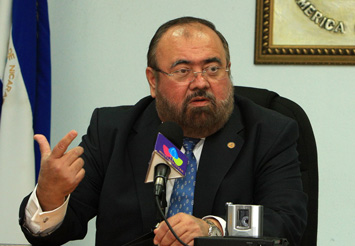De Facto Electoral President Convokes Elections in Nicaragua*
By Tim Rogers
MANAGUA – The de facto president of Nicaragua’s sullied Supreme Electoral Council (CSE) on Thursday convoked presidential elections for Nov. 6, 2011, and informed all political parties they have one week to present their paperwork to participate in the electoral process.
In an announcement made only to Sandinista media outlets during an event closed to independent media, CSE head Roberto Rivas announced that legally established political parties have until next Nov. 6 to present their credentials to participate in the 2011 general elections, which will elect a new president, vice president and 90 lawmakers.
Participating parties will then have until March 18 to present their candidates, according to Rivas’ electoral calendar.
Parties that refuse to participate in the electoral process risk losing their party’s legal status, according to the Electoral Code.
 Though Rivas’s term as president of the CSE expired four months ago, the gridlock in the National Assembly has prevented the election of new magistrates. Rivas, meanwhile, has remained at his post in a de facto manner, arguing that his continuance in power is permitted under President Daniel Ortega’s polemic decree last January extending the terms of 25 top judges and magistrates.
Though Rivas’s term as president of the CSE expired four months ago, the gridlock in the National Assembly has prevented the election of new magistrates. Rivas, meanwhile, has remained at his post in a de facto manner, arguing that his continuance in power is permitted under President Daniel Ortega’s polemic decree last January extending the terms of 25 top judges and magistrates.
In setting the new electoral calendar, Rivas, a close confidant of Ortega, did not clarify the terms or conditions under which electoral observers will be allowed to participate in the process. In recent statements to local press, Rivas said that local observers will be limited or restricted and warned that foreign observers who dare to criticize the electoral process, “Will be put on the first plane back to their own country.”
Rivas, a confrontational personality known for his jet-set lifestyle, has said he will accept Ortega’s candidacy next year despite the constitutional ban preventing consecutive presidential reelection. It’s unclear whether Rivas will take advantage of his de facto post to try to inscribe Ortega’s candidacy before eventually being replaced by the National Assembly.
It’s also unclear whether the opposition parties will participate in Rivas’ electoral convocation, though most parties seem willing to play ball rather than risk losing their legal status, which would prevent them from participating in future elections.
“Of course we are going to participate in the electoral process,” said Roberto Ferrey, president of the Nicaraguan Resistance Party (PRN), the party of the former contras.
The Liberal Constitutional Party (PLC) and other minority parties have also hinted that they will also participate in the process, despite protesting Rivas’ continued presence on the electoral council.
CIvil society, meanwhile, continues to voice its frustration with Nicaragua’s increasingly de facto political situation.
“It’s paradoxical that the same people who are responsible for the (electoral) fraud of Nov. 9, 2008 are convoking a new electoral process,” Carlos Tünnerman, of civil group Movement for Nicaragua, told The Nica Times yesterday. “The people of Nicaragua have to be aware of that.”
However, he added that Rivas’ announcement should not be considered “transcendental,” either, because the law states that elections must be convoked one year in advance.
“So it had to be done. But the problem is that it’s being done by de facto electoral magistrates – by people who are usurping their functions in the Supreme Electoral Council,” Tünnerman said.
The analyst warned that the convocation of elections could be a “trap” laid by Ortega to eliminate other parties that refuse to participate in an election that many consider fraudulent from the start.
Regardless, Tünnerman said, “The most important thing is that those (de facto) magistrates are gone by the time the real elections begin. And that’s the struggle: to remove those fraudulent magistrates from the CSE before they organize the elections next year.”
*SOURCE: www.ticotimes.net

